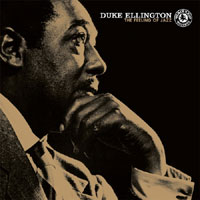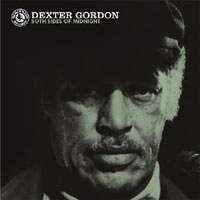Duke Ellington • The Feeling of Jazz
Dexter Gordon • Both Sides of Midnight
n the 1950s and 1960s, while jazz had its roots firmly planted in the United States, many of its greatest practitioners moved to Europe, either permanently or for extended periods of time. Interest in jazz was particularly keen in Europe during that time and many jazz labels sprung up there, especially in the Scandinavian countries and England. In 1968, Alan Bates started the British label Black Lion Records and released recordings of US jazz expatriates, along with some homegrown talent. Any US collector who has spent time in the trenches flipping through jazz record bins has run across Black Lion titles, most commonly those by Ben Webster and Dexter Gordon. Most of these are worth sampling and many are worth repeated listening. Bates also established a subsidiary label for more modern jazz, Freedom Records, and those are mostly found in the US as Arista reissues, produced after Arista purchased the Freedom label in 1975. ORG Music has begun a series of re-releases of Black Lion titles, and this is the second pair available. Some may confuse ORG Music’s names with that of Original Music Group (ORG). ORG has been around for years, and some of its associates split off and formed ORG Music, devoted mostly to more modern pop music. Some of the label's titles, such as the three Nirvana releases, appear to have migrated to the new organization, and the catalog numbers that used to begin with "ORG" are now identified with "ORGM." The Dexter Gordon sides were recorded in 1957, the year before Black Lion was formed, at a live session at the Montmarte Jazzhuis in Copenhagen. Although Bates had not yet formed Black Lion, he was the producer on this recording. The Copenhagen club was one of the best European jazz clubs and many Black Lion sessions were recorded there. Gordon is backed by the "house band" of US stars Kenny Drew on piano and Albert "Tootie" Heath on drums, along with a young Danish bass player, Niels Henning Orsted Pederson, who would go on to become one of the great jazz bassists. Both Sides of Midnight is one of Gordon’s best live recordings. Side one warms up slowly but surely, but side two has Gordon playing a couple of hot Sonny Rollins compositions that make the price of admission well spent. This well-recorded live session is a welcome addition to the Dexter Gordon discography. The Duke Ellington album was recorded in 1962 and was not an Alan Bates project, but a tape he purchased for reissue on Black Lion. The session was recorded at Bell Recording Studio A in New York, a spacious 30' by 60' room with ceilings of over 20' -- one of the best live rooms in New York in the early 1960s. At that time, Ellington was regularly recording for Columbia Records, and the label had New York’s best recording studio, the famous Studio C. So record collectors have a wealth of well-recorded Ellington to choose from. With The Feeling of Jazz, we get Ellington playing tunes he had recorded many times over. The versions performed here are certainly different in many ways from other available versions, but I would be hard-pressed to state a preference for the Black Lion interpretations over others on Columbia. That’s not to say that these are not excellent performances or that they aren’t very well recorded; they are classic 1960s Ellington with top-notch sound. Like the first two ORG Music Black Lion reissues (Thelonious Monk: The London Collection Volume 1 [ORGM-1052] and Miles Davis: Bopping the Blues [ORGM-1048]), these new releases are available in two versions: as a single 33rpm LP at $29.99 or a deluxe three-LP set consisting of 33rpm and 45rpm LPs for $49.99. The 33/45 sets are available exclusively from Music Direct, while the 33rpm LPs are widely available. The packaging of the deluxe sets is different, consisting of three jackets held together with a cardboard band similar to the Japanese OBI. I suspect these bands will not withstand too many efforts to cram three jackets back in. The sound of the 33rpm versions is excellent, and with the exception of the Monk, I think almost anyone would be perfectly happy with the standard package. Each of the albums was mastered at Bernie Grundman’s
studio by Chris Bellman, with Grundman doing the EQ work, and then pressed by Pallas in
Germany. The mastering and pressing are both superb, and the sound is significantly better
than that of the Black Lion LPs you might find. Steve Hoffman is credited as being in
charge of curation. There are no album notes in addition to the original cover notes, so I
assume Hoffman was involved in selecting the correct tapes and the material itself. |


